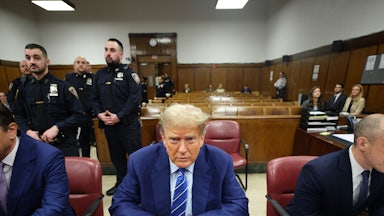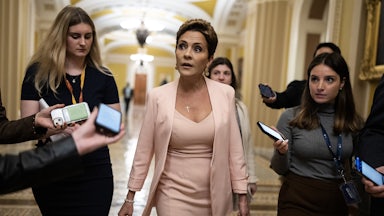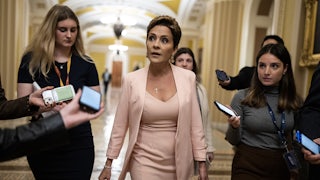It’s been another chaotic day on Capitol Hill as Democratic lawmakers struggle to reach an agreement on a bill containing what remains of the Biden agenda. At this point, you could be forgiven for being confused about what’s actually happening in Congress. In fact, if it makes you feel better, it’s not entirely clear whether members of Congress know what’s happening right now, either, given the constantly changing situation. Thursday began with a visit to House Democrats from President Joe Biden and a plea from Speaker Nancy Pelosi to vote on a bipartisan infrastructure bill that day. But less than 12 hours later, it culminated with an agreement instead to vote on the short-term extension of a surface transportation authorization tonight, ahead of a Halloween deadline, then break for a long weekend and return Monday to take up the infrastructure bill and the Build Back Better Act anew.
It was hard to imagine that the curtain would go down on these proceedings in this fashion on Thursday morning, which had arrived with a new sense of urgency dogging Democratic leadership. It had insisted that action would be taken before the end of October, even though a similar ploy in September failed. President Joe Biden is attending the international G20 summit and the COP26 climate conference this week, and it has been deemed necessary to provide the president with some kind of legislative win to boost his global credibility as he heads into these meetings with world leaders.
The White House released a framework of a $1.85 trillion proposal for Biden’s massive social spending bill on Thursday morning, insisting that it would be able to garner support from all 50 Democratic senators—namely, Senators Joe Manchin and Kyrsten Sinema, whose opposition to various provisions has resulted in a far smaller bill than the $3.5 trillion initially proposed. (On Wednesday, Manchin’s resistance single-handedly ensured that a provision on paid family and medical leave would be cut; any mention of leave was excluded from the White House framework.)
Biden traveled up Pennsylvania Avenue to the Capitol on Thursday, delaying his departure to Europe to present his proposal to House Democrats. He urged Democrats cloistered in the basement meeting room to pass both the large bill, known as the Build Back Better Act, and a bipartisan infrastructure bill passed by the Senate in August. (The bipartisan bill is referred to in shorthand as BIF, or the bipartisan infrastructure framework, harkening back to when it, too, was a mere framework.) House progressives have withheld their support for the BIF, saying that they cannot vote for the bill unless it’s in concert with the Build Back Better Act—thus ensuring the social spending bill will get the needed support from moderates.
“We have a framework that will get 50 votes in the United States Senate,” Biden told members in the caucus meeting, according to a source familiar with his remarks. “I don’t think it’s hyperbole to say that the House and Senate majorities and my presidency will be determined by what happens in the next week.”
House Speaker Nancy Pelosi underscored these needs, telling her members in the caucus meeting that “we must succeed today.” In so doing, she indicated her desire to hold a vote on the bipartisan bill as soon as possible. “When the president gets off that plane, we want him to have a vote of confidence from this Congress,” Pelosi said. Representative Hank Johnson echoed this refrain, telling reporters after a meeting among Congressional Progressive Caucus members that “we cannot send our president across the water to lead the world without showing leadership ourselves.”
“We lead by passing the bipartisan infrastructure deal, while at the same time continuing to fight for the principles that are instilled in the Build Back Better bill,” Johnson said.
Representative Madeleine Dean, a member of the Progressive Caucus and the more moderate New Democratic Caucus, told reporters that even without strong statements from Manchin and Sinema, she trusted Biden and Pelosi.
“I felt from the substance and the affect of the president and the speaker, when he comes in and he says, ‘We have a deal,’ we have a deal,” Dean said.
But this conviction was not shared by many progressives, who insisted that actual legislative text was needed before they could support the bipartisan bill. (The text was released later on Thursday afternoon, but progressive lawmakers also said they wanted to move on the two bills together.) And while some members of the Progressive Caucus may be ready to vote for the bipartisan bill today, a significant number are not—meaning that they can sink the bill, given Democrats’ narrow House majority and the likelihood that it will garner very few Republican votes.
Mere hours later, Pelosi could not confirm whether a vote would be held Thursday when repeatedly pressed by reporters. It’s been a day of ephemeral statements, as the ground repeatedly shifts under lawmakers and the reporters covering them.
The bulk of the framework is focused on childcare and climate provisions, with some funding sprinkled hither and yon for health care and other Democratic priorities. It includes $400 billion for childcare, universal pre-kindergarten, and $200 billion for extending the expanded child tax credit and the earned income tax credit by one year. There is $150 billion aimed at strengthening home care; $130 billion to extend tax credits for the Affordable Care Act, including making them available to millions of uninsured Americans who live in states that have not expanded Medicaid. There would also be some expansion of Medicare, with $35 billion dedicated to establishing a hearing benefit.
Climate provisions account for $555 billion in the framework, the outlay mostly comprised of tax incentives to encourage use of clean energy, along with investments in climate resilience. The remaining provisions include $150 billion for affordable housing; $40 billion for higher education, including investments in Historically Black Colleges and Universities; and $90 billion of targeted “equity” investments.
There is also $100 billion for immigration reform, but this will likely be excluded from the final bill. Democrats are hoping to pass their bill through reconciliation, a process that allows legislation to be approved by a simple majority. There are strict rules for using reconciliation, and the Senate parliamentarian, an expert in the rules of the chamber, is likely to offer the opinion that it cannot be included. (If you’re looking for a little light reading, the bill text clocks in at 1,684 pages.) The proposed revenue streams are expected to cover nearly $2 trillion, and include a new minimum corporate tax rate and a new surtax on millionaires and billionaires.
The framework excludes many of the agenda items Democrats had hoped to include in the bill, namely paid leave, expanding Medicare to cover vision and dental benefits, reducing prescription drug costs, and universal free community college. A tax on billionaires’ capital gains also did not make the cut.
Now, here’s the rub: It’s unclear if the framework—being a framework—or even the text of the bill released by the House will be the final form of the legislation, which remains trapped within the liminal space between becoming and being, a Schrödinger’s bill. And so lawmakers are talking about improvements they want to make, while still praising the framework. “You have the outline of a very significant piece of legislation,” Senator Bernie Sanders told reporters on Thursday. “I want us to make it better.”
Senator Kirsten Gillibrand, who has advocated strongly for including paid leave in the bill, told reporters that “until the deal is actually signed, and we actually vote on it, people are continuing conversations.” (Manchin has said he does not believe reconciliation is the best venue for passing paid leave legislation.) Senator Sheldon Whitehouse told reporters that Majority Leader Chuck Schumer had told Democrats that they had about a week to negotiate what will be in or out of the framework.
The president renewed his insistence that Democrats “badly need a vote on both of these measures,” arguing that the combined impact of the bipartisan bill and the Build Back Better Act would be more significant than the accomplishments of Presidents Franklin D. Roosevelt and Lyndon B. Johnson—both of whom passed historic legislation with significantly larger congressional majorities. Biden later said in public remarks at the White House that the framework was “historic,” claiming that “consensus” had been accomplished through compromise.
But despite the president’s confidence, it’s unclear whether his framework has sufficient legislative support to convince progressives to vote for the bipartisan bill. Manchin and Sinema did not offer overwhelming endorsements of the framework on Thursday; Sinema said in a statement that “we have made significant progress on the proposed budget reconciliation package,” and Manchin told reporters Thursday morning that “it’s in the hands of the House.”
“We haven’t seen the text yet. Everyone has to see it. I don’t think anybody could say they could support it until they see the text,” Manchin told reporters later on Thursday, shortly before the bill was released. This desire to see the bill text was, funnily enough, echoed by many House progressives ahead of its release. (“People have said they want to see text. The text is up,” Speaker Nancy Pelosi pointedly said during her weekly press conference on Thursday afternoon.)
Manchin later tweeted that the framework “is the product of months of negotiations and input from all members of the Democratic Party,” and said, “I would hope all of us will continue to deal in good faith and do what is right for the future of the American people.”
Representative Pramila Jayapal, the chair of the Progressive Caucus, told reporters that members of her caucus were committed to staying through the weekend until the legislative text of the social spending bill is finalized.
“We intend to vote for both bills when the Build Back Better Act is ready. And our members are enthusiastic about voting for both bills when that text is ready,” Jayapal said. Representative Rashida Tlaib was more direct, saying, “Hell no on BIF.”
Jayapal also noted that Biden did not specifically ask for a vote on the bipartisan bill today, even though Pelosi did. Jayapal later met with Sinema on Thursday afternoon, which both of them vaguely characterized afterward as a good discussion.
In a statement later on Thursday on behalf of the Progressive Caucus, Jayapal said that bringing both votes together “cannot be accomplished without legislative text that can be fully assessed and agreed upon by all parties, including 218 Representatives and all 50 senators in the Democratic Caucus.”
“There is too much at stake for working families and our communities to settle for something that can be later misunderstood, amended, or abandoned altogether,” Jayapal said. “Members of our Caucus will not vote for the infrastructure bill without the Build Back Better Act. We will work immediately to finalize and pass both pieces of legislation through the House together.”
Jayapal told reporters even later on Thursday—it’s been that kind of a day—that she believed the bipartisan bill and the Build Back Better Act could pass next week.
The tactic of waiting until both bills were ready was endorsed by some Democratic senators, including Sanders and Senator Tina Smith. “Before there is a vote in the House on the infrastructure bill, members of the House have a right to know that 50 U.S. senators are supporting a strong reconciliation bill,” Sanders said on Thursday morning.
But other senators said that it was time for the House to vote on the BIF.
Senator Chris Coons said that he believed Manchin and Sinema had offered firm enough commitments for House Democrats. “Senator Sinema just said to me on the floor that her view is, and she’s put out a statement, ‘Let’s get this thing done,’” Coons said. “Senator Manchin said to me, ‘This is a framework I could work with.’”
Senator Tim Kaine also argued that the release of the legislative text should be enough for House progressives. “They wanted to see a commitment in the Senate to do a significant reconciliation. I understand that. I think they’ve got that commitment now,” Kaine said. When asked if Sinema and Manchin had been firm enough in their support, Kaine said “I think they’ve been fine.”
“I think the House should act,” Kaine said. (For his part, Manchin told reporters earlier on Thursday that “if [progressives] can’t take the word of the president of the United States, and the speaker, we are in trouble.”)
Representative Don Beyer, a member of the Progressive Caucus, said after the vote on the surface transportation extension that he was satisfied with Manchin’s and Sinema’s assurances and “even more satisfied by President Biden’s assurance.”
“It’s frustrating. And I wish we weren’t there. But it’s a big-tent party, and there are [around] 30 of the progressives in blue districts who feel this is their only chance to get those human infrastructure investments … they believe that they have leverage with Manchin and Sinema by not passing the BIF,” Beyer said. “I’ve never agreed with it. But maybe they’re right, I don’t know.”
[This article is about a breaking news story and has been updated.]










